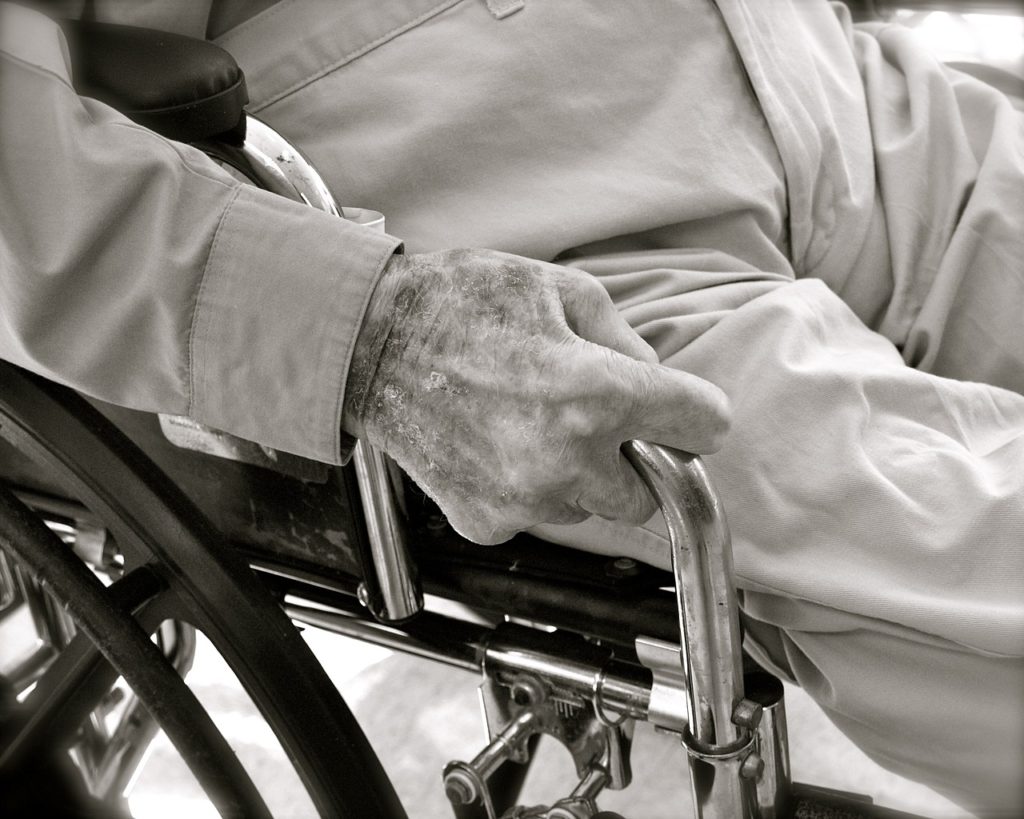Hey there! This post contains affiliate links. Using my links means I earn a commission, which helps me create more rad content. More on affiliates here.
Well, hello cuties!
We’re taking a sharp left away from fashion today, to delve into personal storytelling and federal aid programs.
WHAT A TREAT, am I right?
[Heads up! This post uses affiliate links, and you help me earn $$ when you use my links. More on affiliate links here!]
There’s this erroneous idea that Medicaid/Medicare will pay for long term care, and that’s partially correct. BECAUSE before a facility will accept state $$$, you have to go thru what’s called a “spend down” period.
— Brianne Huntsman???? (@the_huntswoman) May 30, 2019
Hello, SEA-TAC
For the past few months, I’ve been stepping in as caregiver relief for my aunts who are taking care of my elderly grandparents (on my mom’s side). This has meant a lot of online research, as I don’t live in Seattle, and flying out to help. Currently, I’m on trip #2, writing at my Aunt’s table.
Due to a fvck ton of family drama and trauma, I’ve had very little to no interaction with these family members. Real talk: Before flying up to Seattle in October, 3 years had gone by without my talking to my grandparents on the phone.
Yeah. It’s like that.

Telling My Own Story
While the story of my mom’s family would make a good memoir, it’s not necessarily my story to tell. It’s the story of my aunts and uncles. So, I’m going to stick to telling my story and perspective without traipsing into where they’re at.
Also, because I’m staying at my aunt’s house, and I’m really enjoying perusing her wine collection (kidding not kidding, Aunt Becky!)
Caregiving
It’s one of the hallmarks of adulthood, to move from being the one who is cared for to caring for other people. Having to step up and care for my grandparents, has definitely been a switch in perception!
You know in cartoons where Donald Duck or Tom have their heads flattened? That is EXACTLY what it felt like to walk into this situation with my grandparents. The amount of information, follow-up appointments, and the intricacies of the VA, federal red tape and social services is mind blowing. At least 1 appointment a week, with endless phone calls to doctors offices.
My aunts have been INCREDIBLE at navigating systems and organizing resources. I am in awe of them.
But, the emotional side or story of helping elderly relatives will have to wait. Instead, I’d like to share some information with my fellow millennials, some of whom are beginning to stare down the path of taking care of *their* parents.
This shit ain’t cute.
Below, you will find some of my learnings, as well as a “Here’s how to prepare for what’s coming” to-do list.
Will this be helpful? Yes. Will anyone read this, or will folks stick their heads in the sand? A few will. November is National Caregivers Month, and I’d like to drop some knowledge. But I’m determined to NOT be the only 27-year-old with this information in the United States, SO DO WITH IT WHAT YOU WILL.

Section One: Independent Living, Assisted Living & Skilled Nursing Facilities
When folks talk about “putting my grandparents in a home,” that can mean a few different things.
Level 1 | Independent Senior Living
Elderly folks are living on their own, generally in a “community” of condos and apartments. There are activities, and rooms for social events (maybe a theater, pool, etc). The atmosphere is almost cruise-ship like, or similar to college dorms. There isn’t medical care (like staff that will help seniors bathe or oversee medications), but caregivers do come through. Some independent living facilities take care of cooking meals and others don’t.
And, the typical price of living in independent living starts at around $4,000 a month for two people.
Yes, you read that right.
Facilities do exist for low-income folks, and those costs are generally similar to the rental rates of a given city.

Level 2 | Assisted Living Facility:
An Assisted Living Facility (or “ALF”) is generally what one thinks of when one thinks of “putting someone in a home.” There are medical staff (nurses, CNAs, etc) who help with medical needs. There’s still the social aspect of an Independent Living place, but added medical staff.
To make things complicated, pricing for an assisted living facility is assigned by the level of care needed. Someone with little care needed may be a level 1, and someone with a LOT of care needed is a level 5. Almost always, having diabetes automatically means a higher level of care is assigned.
There’s a base charge for assisted living, and an additional charge for the amount of care needed. An assisted living facility works with a senior’s doctors to assign them a level of care needed. That level of care corresponds to an additional monthly amount, which is to say: If a senior’s condition worsens, the cost of care will go up.
The more care needed, the more costly.
Hospice & Memory Care
Some Assisted Living Facilities stop at a certain level of care. For example, if a senior is diagnosed with Alzheimers or Dementia, they may go into a facility that offers “Memory Care.” Or the facility may have a memory care unit – truly depends!
An inclusive assisted living facility may offer “Hospice Care” (AKA “end of life” care), but many don’t – requiring seniors to be moved to a facility that offers or specializes in hospice.
Cost: In Seattle, these facilities are generally around $7,000 a month for two people. A friend from San Francisco told me a regular and not-fancy facility runs $12,000 a month.
“How do people PAY for that?!” you may ask? Keep reading.

Level 2B | Adult Homes
For people who can’t afford an assisted living facility (or don’t want to enter one), there are adult homes. There’s a full-time caregiver onsite, and anywhere from 3-7 (ish) seniors live in one family style home.
Pricing on adult homes can vary, but you’re looking at around $4,500 starting for one person.
Level 3 | Skilled Nursing Facilities
THESE facilities are why there’s a stereotype around “nursing homes.” They have hospital beds, medical (MD and RN, generally) staff on hand. People move into a facility like this if they need medications through an IV or require more care than an assisted living facility can handle.
Pricing on these facilities vary, but they’re sometimes partially paid for by insurance.
Elder Care Section 2: How Do People Pay for This??
Care is not inexpensive. It’s nothing to sneeze at. If you’ve found your way here because you’re looking at the costs of care (specifically for assisted living facilities) and don’t know what to do, I’ve shared resources below.
“Medicaid Spend Down”
Many people think that “the government will take care of people who can’t afford assisted living.”
Kind of true. Mostly not.
Most Facilities are Private – Not Government Run
When people go into assisted living, they generally have to pay privately for 24 months. They go through what’s called a “Medicaid Spend Down” period where they have to liquidate their assets (stocks, housing, etc) to pay for care.
At the end of this 24 months, seniors can go onto Medicaid and have Medicaid pay for a private facility. This ISN’T to say that Medicaid won’t pay for insurance before a spend down – we’re talking covering the monthly costs of a facility.
People who are not able to privately pay BEFORE medicaid kicks in do not get a room at a private facility. They generally have to wait for a government own//subsidized facility, and the wait list for those are LONG. Like 1-3 years for the Seattle area.

“But… what if there aren’t any assets?”
Okay, here’s where things get dystopian. If you don’t have the necessary amount of money to pay for an assisted living facility immediately (~$150,000 a year), you’re kind of fvcked.
I say this as someone who’s been there. My grandparents ended up in this strange “in between” place, where we could privately pay for their assisted living, but going off of Medicaid meant tens of thousands of dollars a month in medical costs they would have to pay out of pocket (no, I’m not exaggerating). While I work on becoming a multi-millionaire, folks in my family aren’t able to pay $20K+ a month for care and medical.
Assisted Living Facilities require 24 months of private pay (while you’re going through “Medicaid Spend Down”) generally because seniors tend to pass away at twenty months of living in a facility. Yeah, it’s morbid and not-fun to say, but I got you and I’m going to say it:
Facilities bank on the fact that seniors will die and never require medicaid, and will private pay until they pass.
Paging Margaret Atwood.

Medicaid Immediate Rooms
HOWEVER, many states offer a tax break to facilities who offer a certain number of “medicaid immediate rooms,” rooms that are available for immediate medicaid. Because the need is great, the waiting list to get into one of these rooms can get quite long.
If you’re in this position, keep reading:
Elder Care Advice Section 3: Resources
If your elders cannot privately pay for assisted living, you’re going to have to spend time (not money) in tracking down and acquiring federal resources. You’re going to have to get SUPER honest with federal employees or community health specialists about the financial state your seniors are in. Now is NOT the time for a stiff upper lip.
When it comes to communicating with your seniors, you may want to word this like, “I know talking about money with your kids/grandkids is uncomfortable and embarrassing, but I need this information to get you help.”
You’re ALSO going to want to have a place to track all of the information you’ve been told. Don’t take things at face value. Make it a point to meet with different reps from a particular organization or program. By diversifying WHERE you get your knowledge from, you can better help yourself.
The squeaky wheel gets the grease. Don’t be afraid to be abrasive. ADVOCATE for yourself, darling!

Here’s where to start:
1. State Department of Social and Health Services
It’s time to get a social worker, my friend. Find a service office (your state website will have one) and make an appointment to talk to someone about elder care. In that appointment, you need to be SUPER DUPER honest about what’s going on.
Bring in information on the EXACT income your seniors make. Ask about in-home caregivers (trained people who can come into your home, and are paid for by the state) and other programs.
2. Veteran’s Affairs
If your senior(s) served in the military, they may be entitled to certain programs from the VA. The eligibility is really dependent on the type of military service, so contact the Veterans Benefits Administration, and specifically ask about what programs your senior(s) can apply for. Here’s a list of VA Benefits offices by geography.
3. Community Health Programs
If you’re struggling to figure out how to pay for dentures or hearing aids, there is HOPE! You may be able to apply for state assistance for both hearing aids and dentures. You may also find a dental clinic for low-income folks, or use the services of a dental school in your area. (Is a dental school ideal? Nope, not really! But better to do that than to not have the use of one’s teeth!)
4. Medicaid Insurance
If paying the premiums for Medicare Part A or B is a hardship, you definitely want to look into going on Medicaid insurance. Reach out to your local medicaid office for income requirements.
5. Intake Staff at Assisted Living Facilities
Generally, the intake staff at a facility are bureaucratic goddesses. They will likely know the VA programs and other programs you should look into. When we were looking at facilities, these people were helpful in connecting us with resources. If you can’t pay for a private facility, reach out anyways.
5. Church or Temple
Helping the elderly is generally part of a religion’s organization, and your grandparent’s church or temple may have resources for elders.
Elder Care Advice Section 4: Prepping Now
OKAY, so. You’ve read through the above, and you’re a liiiittle freaked out. If you feel like you’re on the hook for paying for your parents (or grandparents) retirement in addition to your own, it’s time to sit down and have a REAL TALk.
Here’s an empowering to-do list to start tackling this now:

- Take a shot of whisky, meditate or whatever you gotta do – because these conversations are gonna make you uncomfortable. Grit your teeth and do it.
- Retirement Plan: What is your parents retirement plan? Do they have one? Do they have LTC (Longterm care) insurance for moving into a facility? Note: Your parents may not want to share this with you, but be stubborn! You’re the one who will be writing the check if things go awry.
- Power of Attorney: You may want to get power of attorney for your parents (or grandparents). There are various types (legal, medical, financial, etc). Doing this lets you speak with lawyers and case workers on their behalf.
- Make sure your parents or grandparents have a will and beneficiaries named on their accounts. Many a widow has been locked out of her bank account because she wasn’t on it. YOU don’t want to be the one paying your parent’s bills while you get that sorted.
- Financial Advisor: If YOU haven’t met with a financial advisor to start planning your retirement, now is the time. I take a Jim Ferris attitude to retirement (AKA, I’ll work and party and design and and…. until I’m in the ground), but having a retirement set up is a NECESSITY.
What to Read Next —>
- 7 Personal Finance Book for Women – My Recommendations
- How I Paid Off My Wells Fargo Credit Card
- 13 Phrases That Will Make You a Better Communicator
- How ADHD Meds Impacted My Life
If you’d like to keep in touch, be sure to subscribe to my newsletter, so you’ll stay up-to-date on new brands and product reviews!












